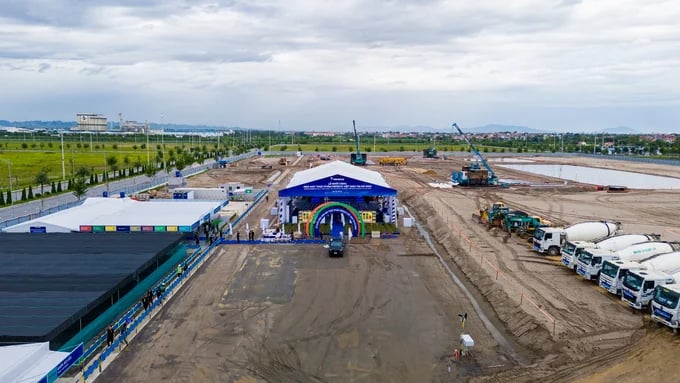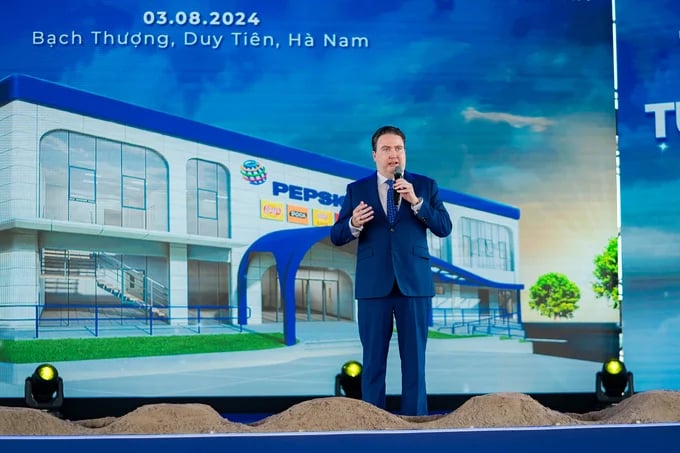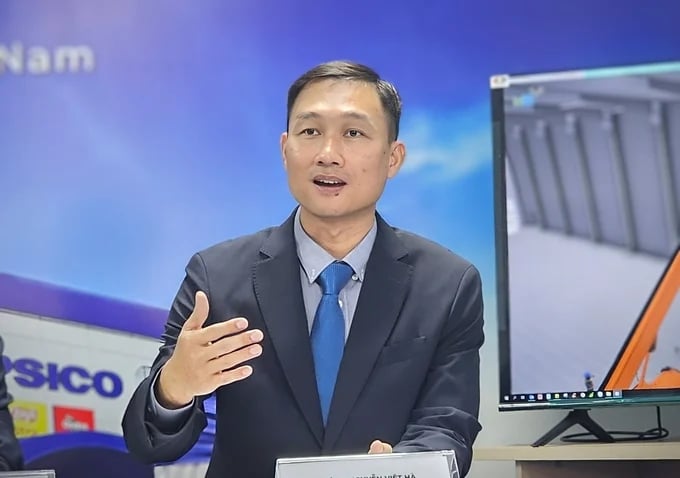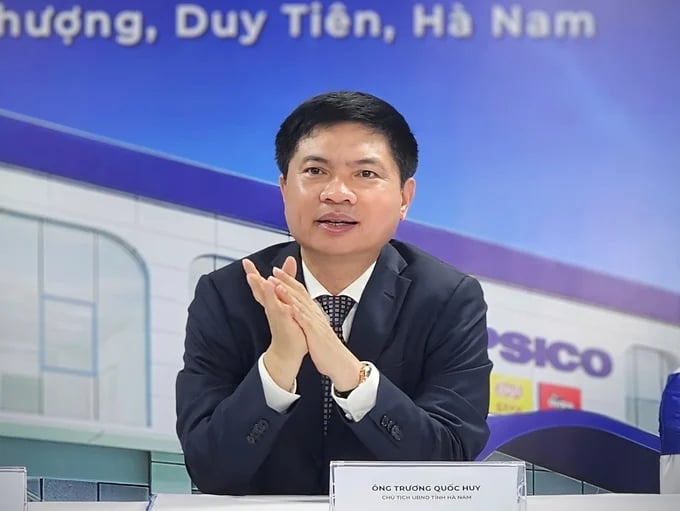November 19, 2025 | 03:55 GMT +7
November 19, 2025 | 03:55 GMT +7
Hotline: 0913.378.918
November 19, 2025 | 03:55 GMT +7
Hotline: 0913.378.918
PepsiCo is one of the world's leading food and beverage companies, with product lines including Lay’s, Doritos, Cheetos, Gatorade, Pepsi-Cola, Mountain Dew, Quaker, and SodaStream. In 2023, PepsiCo's net revenue exceeded $ 91 billion.
Marking the 30th anniversary of its presence in the Vietnamese market, on August 3, PepsiCo Foods Vietnam officially broke ground on its second modern food manufacturing plant in Ha Nam province, with a total investment of over VND 2,000 billion.

PepsiCo Foods Vietnam's second snack production plant is being built in the expanded Dong Van I Industrial Park (Ha Nam) with a total investment of over VND 2,000 billion. Photo: Nam Khanh.
Covering an area of 80,000 m2, the plant will have a production capacity of more than 20,000 tons of snacks/year. The new facility is expected to become a key production hub for PepsiCo Foods in Vietnam once completed in the third quarter of 2025.
In the Central Highlands, the agronomy division of PepsiCo Foods Vietnam has partnered with local farmers to increase potato yields by 300%, from 8 tons/ha to 25 tons/ha, with the goal of further increasing yields to 30 tons/ha in the coming years. The average income for farmers working with PepsiCo Foods Vietnam to grow potatoes ranges from VND 95 -100 million/ha.
To supply raw materials for the plant's operations, PepsiCo Foods Vietnam has established a raw material sourcing area by collaborating with farmers in various regions, including Ha Nam, Hai Duong, and Thanh Hoa... The company ensures the purchase of these raw materials at fixed prices.
Additionally, PepsiCo Foods Vietnam has a team of agronomists who assist farmers in applying sustainable agricultural practices as part of the global PepsiCo Positive (pep+) strategy. The aim is to achieve 100% sustainable sourcing and promote regenerative agriculture by 2030.
In Ha Nam, PepsiCo Foods Vietnam is also working with the Department of Agriculture and Rural Development, local agricultural cooperatives, and farmers to implement regenerative farming practices, improve soil quality, reduce carbon emissions, and optimize crop yields. In collaboration with the Ha Nam Department of Labor, Invalids, and Social Affairs, PepsiCo Foods is implementing the "Enhancing Skills and Quality of Ha Nam Youth Labor" program, funded by the PepsiCo Foundation, to equip local youth with essential soft skills such as communication, teamwork, problem-solving, and digital skills to meet the demands of a modern industrial work environment.
This initiative highlights PepsiCo Foods Vietnam's role in building a sustainable agriculture sector, contributing to improving the livelihoods of local farmers and the northern provinces.

Mr. Marc E. Knapper, U.S. Ambassador to Vietnam, spoke at the groundbreaking event. Photo: Nam Khanh.
At the ceremony for the construction of the new factory, Mr. Marc E. Knapper, U.S. Ambassador to Vietnam, stated, “PepsiCo is one of the leading American companies, representing the U.S. commitment to sustainable development in the agricultural sector, contributing to enhancing the capabilities of local farmers and workers. These efforts by the U.S., as well as by PepsiCo, are aimed at creating sustainable value for the community”.
With the expectation of contributing to the socio-economic development of the country, PepsiCo Foods Vietnam, through the construction of the food production plant in Ha Nam, will support farmers in adopting sustainable agricultural practices as part of the global pep+ strategy. The goal is to achieve 100% sustainable sourcing and promote regenerative agriculture by 2030.
“Investing in Ha Nam province reaffirms our confidence in the dynamic economy and the people here. The groundbreaking of this new factory reflects our long-term investment commitment and our desire to contribute to the sustainable development of the country. The factory aims to exceed production capacity targets. We aspire to build a sustainable ecosystem that benefits consumers, partners, and the environment, as well as a community with shared positive values and sustainable development”, said Nguyen Viet Ha, General Director of PepsiCo Foods Vietnam.

Mr. Nguyen Viet Ha, General Director of PepsiCo Foods Vietnam Photo: Nam Khanh.
Mr. Ha also mentioned that the new PepsiCo Foods Vietnam factory will utilize renewable energy, including a rooftop solar panel installation and a biomass system that uses local agricultural waste to generate electricity. This approach will significantly reduce PepsiCo Foods' carbon emissions and minimize its environmental impact. Once operational, the factory is expected to be a strong driver of local development by creating numerous job opportunities in sectors such as manufacturing, logistics, packaging, and agriculture..., with over 1,000 direct and indirect jobs anticipated.
At the groundbreaking ceremony, Mr Truong Quoc Huy, Chairman of the Ha Nam Provincial People's Committee, emphasized, "The groundbreaking of PepsiCo Foods Vietnam's new factory in Ha Nam contributes to realizing the goal of making Ha Nam a modern industrial province by 2025. The province hopes the company will focus on training a high-quality workforce, utilizing modern, environmentally-friendly technology, and delivering quality products to consumers."

Mr. Truong Quoc Huy, Chairman of the Ha Nam Provincial People's Committee. Photo: Nam Khanh.
According to Mr. Nguyen Viet Ha, PepsiCo Foods Vietnam is committed to prioritizing the use of domestic raw materials and supporting farmers participating in PepsiCo’s sustainable potato farming program. This program focuses on improving income and working conditions for laborers, expanding production, and adopting renewable energy solutions. These efforts align with the global PepsiCo Positive strategy and Vietnam's Green Growth Strategy.
PepsiCo aims to enhance the livelihoods of 250,000 people within its agricultural supply chain by 2030 and achieve Net-Zero emissions by 2040. The company is committed to reducing water usage, promoting sustainable packaging, and utilizing renewable energy. Additionally, PepsiCo is dedicated to developing better products for the planet and people by reducing sugar, sodium, and saturated fats. With its commitment and resources, PepsiCo promises to contribute to economic recovery and improve the lives of workers and communities in Vietnam.
As a member of the Partnership for Sustainable Agriculture in Vietnam (PSAV) under the Ministry of Agriculture and Rural Development, PepsiCo's overall development strategy focuses on sustainable agriculture. This involves collaborating with farmers and partners to create value chains for agricultural products, ensuring not only a steady local supply of raw materials for the company but also securing long-term livelihoods for farmers.
Translated by Hoang Duy

(VAN) SEIKI Group envisions itself as a pioneer in the ‘dual transformation’ of digital technology and green industry, standing alongside the Government and Vietnamese businesses in their pursuit of sustainable development.

(VAN) The VNGEONET network affirms Viet Nam's progress in mastering digital space, providing a precise positioning data platform to serve socioeconomic development.
/2025/11/14/3247-1-184556_35.jpg)
(VAN) Thai Nguyen is methodically implementing digital transformation in the livestock sector, laying the foundation for a modern, transparent, and sustainable agriculture.

(VAN) The year 2025 marks 80 years of development of the Agriculture and Environment sector, a proud journey with significant progress in production, integration and sustainable growth.

(VAN) De Heus continues to steadfastly pursue sustainable development, building linked value chains with farmers and businesses in Viet Nam.

(VAN) From the rich lands of Co Do (Can Tho), an enterprise is amplifying the value of the clean rice grain, a symbol of the vitality and pride of the Mekong Delta.

(VAN) The Vietnamese irrigation sector has undergone a remarkable transformation, becoming a proactive force in disaster prevention, climate adaptation, and risk management in the era of climate change.